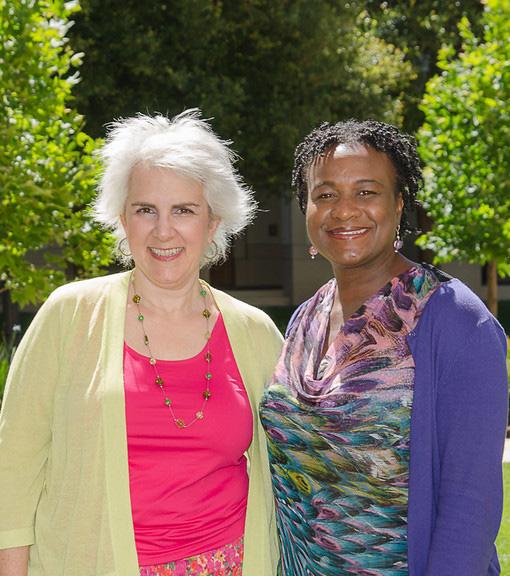
New faculty director at Gardner Center
The John W. Gardner Center for Youth and Their Communities announced that Prudence Carter, professor of education and (by courtesy) sociology, will become its new faculty director, effective September 1.
The Gardner Center partners with communities locally and nationwide to develop leadership, conduct research, and effect change to improve the lives of youth. “What draws me to this center is its focus on understanding how communities as a whole, rather than individual institutions, can come together to support their youth to develop into productive adulthood,” Carter said. “The center’s mission dovetails perfectly with my commitment to advancing the prospects for our youth by building an ecology of support for them in and out of school.”
Carter has gained international renown for her efforts to develop evidence-based policies that support children and youth. As co-editor of the new book Closing the Opportunity Gap: What America Must Do to Give Every Child an Even Chance (Oxford University Press, April 2013), she has helped to reframe the achievement gap to be thought of, instead, as the opportunity gap, and to present concrete, detailed policies for bridging this gap which arises from broader social problems than just school performance. Prior to the Gardner Center appointment, Carter was co-director of the Stanford Center for Opportunity Policy in Education (SCOPE). She will remain a faculty affiliate of SCOPE.
“The Gardner Center could not be more pleased about Prudence’s appointment as our new faculty director,” said the center’s executive director Amy Gerstein. “Prudence brings a wealth of knowledge and expertise, and brings us closer to the faculty and students at the heart of the Graduate School of Education.”
Named for the prolific thinker, innovator, and activist John W. Gardner, the center was founded at Stanford’s education school in 2001 by Milbrey McLaughlin, the David Jacks Professor of Education and Public Policy, now emerita, who worked closely with Gardner himself to launch it. Carter succeeds her as faculty director.
“Under Milbrey’s direction, the Gardner Center has become more than just a research powerhouse,” said Claude Steele, dean of the Graduate School of Education. “It has offered a new model for how university research can affect change, and has made better the lives of youth.
“I am looking forward to Prudence’s continuing the center’s reputation for excellence,” he added.
The 20 researchers and staff at the Gardner Center have a variety of projects underway in collaboration with a diverse set of community groups and educational institutions locally and nationwide. For example, the center has a leadership role in the College Readiness Indicator Systems (CRIS), an ambitious national endeavor funded by the Bill and Melinda Gates Foundation to develop and study the implementation of a system of indicators designed to significantly increase the number of students who graduate from high school ready to succeed in college. The goal of the CRIS project is to identify students who need help to graduate from high school prepared for postsecondary education and, importantly, to enable district leaders to identify and fill gaps in student supports and to be proactive in promoting college-going behaviors and attitudes. In partnership with the Annenberg Institute for School Reform at Brown University and the Consortium on Chicago School Research at the University of Chicago, the Gardner Center is supporting and guiding school districts in Pennsylvania, Texas, New York and California to develop their CRIS.
Early Childhood Education is another Gardner Center focus area. Research shows that children experience a smoother transition into elementary school when there is coordination among schools, early childhood education programs, and families. As a partner in The Early Childhood Education and Community Schools Linkage Project, an initiative of the Coalition for Community Schools at the Institute for Educational Leadership, with support from the W.K. Kellogg Foundation, Gardner Center researchers conducted an implementation study to better understand the practices, outcomes, and conditions that facilitate and hinder the building of smooth, effective, and sustainable linkages, collecting data in nine project sites (in Oregon, New Mexico, and Oklahoma) over the course of the past three years. Results from this work have supported concrete changes in discourse and practice, elevated the importance of improved linkages, and fostered increased capacity to sustain and scale improved linkages within the project’s demonstration sites. The findings promote the understanding of how to help vulnerable children and families to thrive in their transition to elementary school.
Cross-sector community youth development is a core Gardner Center value. In December, San Francisco Mayor Ed Lee announced that the U.S Department of Education selected the City’s Mission Economic Development Agency (MEDA) to receive a five-year $30 million Promise Neighborhood implementation grant to address the cycle of poverty for youth in the Mission District. The Gardner Center was selected as the implementation research partner on the expansive five-year effort. It will work with the designated national evaluator to design and manage the Mission Promise Neighborhood quantitative evaluation process, assist MEDA in creating data standards and parameters, build capacity among Mission Promise Neighborhood partners, and work with partners to identify additional data indicators as new information emerges during implementation.
“The Gardner Center research team is producing results that are making a real difference in the lives of children and youth in what is proving to be a dynamic period of change in educational and social policy and practice,” said Carter.
Gerstein said that Carter’s arrival will help to accelerate this progress. “The alignment of Prudence’s interests in creating ecosystems of community support to close the opportunity gap and the Gardner Center’s broad youth development mandate and deep community relationships creates a robust research focus for us going forward,” she said. “We can’t wait to get started.”
Nancy Mancini is communications manager at the John W. Gardner Center for Youth and Their Communities.



